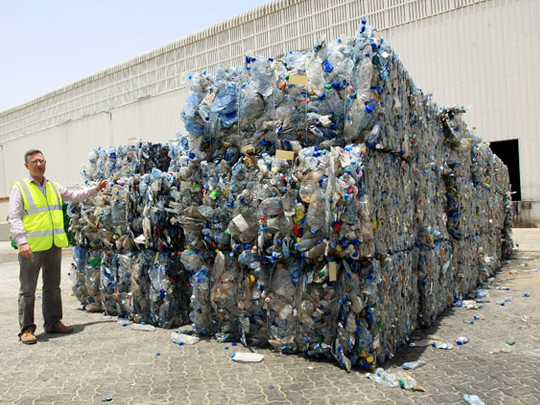
Sharjah: Recycling levels in Sharjah have peaked to an all time high since January. However, segregated rubbish in other emirates may be ending up in landfills as waste management strategies are in a ‘state of flux,' a senior official told Gulf News.
"Yes, waste does get recycled depending on where you are," said Jeremy Byatt, vice president of environment at Bee'ah, Sharjah's waste handling company, "but this does differ per emirate because infrastructure is at different stages."
The landfill site in Al Saj'ah managed by Bee'ah swells with waste every day, and receives about 23,000 tonnes of municipal waste per month. It measures approximately four square kilometres.
Since the start of the year however, 34 per cent of that waste has been recycled.
Plastic recycling alone has increased by 700 per cent from March 2010 to 2011 including PET and mixed plastic. Paper and cardboard has gone up by 366 per cent, followed by a 135 per cent increase in aluminium recycling for the same period.
Overall system
According to Byatt, segregation efforts by residents should not cease as the market for certain materials is growing. "If resources are short why are we throwing stuff out? Stuff we've used for under a day? Part of the overall recycling system involves people putting things in recycling bins or landfill, until people realise there's stuff there to make stuff from," he said.
"We're in a transition period but a recycling revolution in the UAE will be good for the economy. All kinds of developments are happening; we just need to give it a few years."
Recycling should be profitable, said Byatt and for Bee'ah, which was established four years ago, that moment is getting close.
Bee'ah aims to increase the amount of waste not going to landfill from 33.7 per cent to 40 per cent by the end of 2012, said James McGuire, director of operations.
"We recover materials if they have a commercial value and we can create a market for them. Storing and piling up materials we can't sell or recycle doesn't help," he said.
Bane of plastic
McGuire added that the volume of plastic bags that the plant processed was too high. "Plastic bags are the bane of everything that's bad. They are just not necessary. Biodegradable bags are not likely to degrade any quicker in landfill as they need sunlight and oxygen to break down," he said.
The Al Saj'ah landfill is 10 metres deep and rises 25 metres above sea level.
Waste recovery
Instead of going to Sharjah's Al Saj'ah landfill last year, more than 100 million kilogrammes of organic waste was recycled, 90 per cent of construction and demolition waste was recovered, and more than 286,000 tyres were recycled per month at the Tyre Recycling Facility, all operated by Bee'ah.












